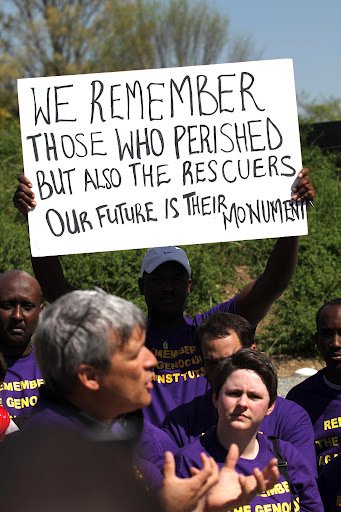Remembering Rwanda
Professor Organizes Conference To Commemorate 1994 Rwanda Genocide
 The death toll was estimated at more than four times the population of Salt Lake City. In April 1994, genocide began in Rwanda. For 100 days, around 800,000 Rwandans fell victim to the violence. Today, 20 years later, Weber State University political science professor Stephanie Wolfe, whose expertise lies in studying atrocities and crimes against humanity, has organized a conference, “Rwanda 20 Years After: Memory, Justice, and Recovery in the Shadow of Genocide,” to remember and study the tragedy.
The death toll was estimated at more than four times the population of Salt Lake City. In April 1994, genocide began in Rwanda. For 100 days, around 800,000 Rwandans fell victim to the violence. Today, 20 years later, Weber State University political science professor Stephanie Wolfe, whose expertise lies in studying atrocities and crimes against humanity, has organized a conference, “Rwanda 20 Years After: Memory, Justice, and Recovery in the Shadow of Genocide,” to remember and study the tragedy.
The conference will be held March 28–30 and will launch WSU’s Rwandan Commemoration Week. Sessions will analyze the genocide from various perspectives in academic research and field experience. Registration costs $50 for students and $100 for the general public, and includes access to 14 panel sessions, networking opportunities, and continental breakfast, lunch and snacks.
Two events will be free and open to the public. Carl Wilkens, the only American to stay in Rwanda during the genocide, will speak March 28 at 7 p.m. in Shepherd Union Ballroom B. Jacqueline Murekatete, a genocide survivor, will speak March 31 at 12:30 p.m. in Elizabeth Hall 229.
Wilkens, head of the Adventist Development and Relief Agency, negotiated with government leaders to help save more than 400 people during the genocide. “The only American to stay in Rwanda saved hundreds of lives. How many more could have been saved if the peacekeeping forces — who were pulled out — had stayed?” Wolfe asked.
Fall 2013 was Wolfe’s first semester at WSU. In less than a year, her dedication to furthering human rights and helping students broaden their horizons and get involved in modern issues led her to organize both the conference and a study abroad trip to Rwanda.
“Decades after these events, and even after genocide and crimes against humanity became more common terms, horrific crimes are still being committed in the name of the state,” Wolfe said. “The Rwandan genocide was only 20 years ago, and it’s a vital part of modern history. It clearly demonstrates how the words ‘never again’ fail to stop atrocities due to a lack of political will and how human rights are overlooked in the name of national interest.”
 Wolfe’s inspiration for the conference came after attending the 18th commemoration event of the Rwandan genocide in Washington, D.C. “It was both incredibly moving and educational. As we were coming up on the 20th anniversary I wanted to engage the local community and students in a similar way,” she said.
Wolfe’s inspiration for the conference came after attending the 18th commemoration event of the Rwandan genocide in Washington, D.C. “It was both incredibly moving and educational. As we were coming up on the 20th anniversary I wanted to engage the local community and students in a similar way,” she said.
Wolfe hopes the multidisciplinary conference, which has already attracted scholars and political activists from around the world, will help students connect the Rwandan genocide to modern, current events. “There will be something for everyone,” she said. “We’ll have lawyers and poets in the same conference, where together we can hope for the future and mourn the past.”
Wolfe will lead a study abroad to Rwanda in May and June of this year. The 35-day trip will allow students to tour and explore Rwanda, visit historical sites and interact with Rwandan students to explore peace building, transitional justice and democracy promotion.
Heavily involved in Amnesty International, Wolfe hopes to instill in students a sense of service and broader interest in human rights. “I would like to make a difference in the world, and to help my students find their opportunities to help as well,” she said. “I want students to realize what happened, to understand the price of inaction, but also to understand how even one individual can truly make a difference when they stand up and say ‘no more.’”